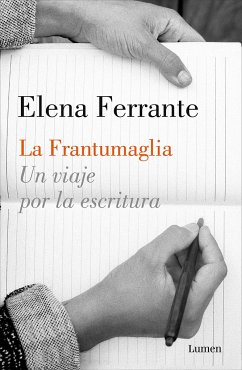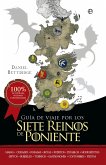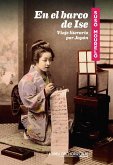Un volumen donde se recogen, en forma de cartas o entrevistas, las fuentes del trabajo de Elena Ferrante. «¿Sabes eso de que te ronden la cabeza las notas de una pieza, y luego, cuando te pones a cantarla, la canción es totalmente distinta de la que te obsesionaba? ¿O cuando tienes muy presente la esquina de una calle pero no sabes dónde queda? Para darle un nombre a estos fragmentos uso una palabra que es de mi madre: Frantumaglia. Son cachos y pedazos que vienen de no se sabe dónde y hacen ruido, incluso molestan...» comentaba Ferrante con su editora, Sandra Ozzola en la primavera del 2015. «Frantumaglia» son los pedazos que amueblan el laboratorio de Elena Ferrante desde que empezó a escribir, a principios de los años 90, hasta hoy, cuando la crítica y el público aclaman esta figura como un clásico contemporáneo. Leer este libro es como abrir los cajones de su mesa y fijar la mirada en el cómo y por qué Ferrante escribió primero las tres novelas de Crónicas del desamor y luego la espléndida saga «Dos amigas». El texto se compone de cartas a sus editores, entrevistas y diálogos apasionados con lectores privilegiados, que han llegado hasta el fondo de la escritura de Ferrante y han entendido su «anchura». Aparecen también la infancia, las ciudades queridas por Elena, su almacén de recuerdos..., en suma, todo lo necesario para conformar el retrato de un gran autor. ENGLISH DESCRIPTION Named one of The Guardian's ""Best Books of 2016"" From the author of My Brilliant Friend This book invites readers into Elena Ferrante's workshop. It offers a glimpse into the drawers of her writing desk, those drawers from which emerged her three early standalone novels and the four installments of My Brilliant Friend, known in English as the Neapolitan Quartet. Consisting of over 20 years of letters, essays, reflections, and interviews, it is a unique depiction of an author who embodies a consummate passion for writing. In these pages Ferrante answers many of her readers' questions. She addresses her choice to stand aside and let her books live autonomous lives. She discusses her thoughts and concerns as her novels are being adapted into films. She talks about the challenge of finding concise answers to interview questions. She explains the joys and the struggles of writing, the anguish of composing a story only to discover that that story isn't good enough. She contemplates her relationship with psychoanalysis, with the cities she has lived in, with motherhood, with feminism, and with her childhood as a storehouse for memories, impressions, and fantasies. The result is a vibrant and intimate self-portrait of a writer at work.
Hinweis: Dieser Artikel kann nur an eine deutsche Lieferadresse ausgeliefert werden.
Hinweis: Dieser Artikel kann nur an eine deutsche Lieferadresse ausgeliefert werden.








